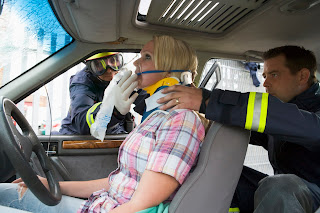By John Mordecai
 There is no
way to anticipate being involved in a crash. Car and truck crashes happen in a
split second but can change lives forever. Injury victims must deal with pain,
suffering, inconvenience, and lost income – not only temporarily but frequently
over the course of a lifetime. No one is ever prepared when an injury occurs,
so the attorney you choose has to be.
There is no
way to anticipate being involved in a crash. Car and truck crashes happen in a
split second but can change lives forever. Injury victims must deal with pain,
suffering, inconvenience, and lost income – not only temporarily but frequently
over the course of a lifetime. No one is ever prepared when an injury occurs,
so the attorney you choose has to be.
It may not be possible to accomplish all of these suggestions but accomplishing
any of the following will be helpful in preserving valuable evidence:
1. Emergency: Call 911 to report the crash and any injuries to those involved.
2. Parties: Obtain and confirm the identity of the negligent driver first -
then those of any other involved drivers from their driver’s licenses.
3.
Witnesses: Try to obtain the names,
telephone number and addresses of all witnesses to the crash or of anyone who might
have heard anything said by the negligent driver.
4. Admissions of Fault by the Other Driver: Make a point of remembering all statements made by the negligent
driver – whether to you or anyone else. Oftentimes, they will admit they caused
of the crash to you then, change their story by the time the police arrive
after speaking with their insurance company or lawyer.
5.
Impaired Driving: If you suspect
the at fault driver has been drinking or otherwise impaired, be sure to note
the smell of alcohol, marijuana, slurred speech, red or blurry eyes, lack of coordination
or difficulties with balance.
7.
Evidence of Your Injuries: Take photos of
your visible injuries - both initially and throughout the healing process;
these would include cuts, bruising, scrapes or stitches.
8.
Proof of Your Expenses: Retain receipts
for all your out-of-pocket expenses. This is evidence of your economic losses
that we will need for you case. Examples of out of pocket expenses are health
insurance deductibles paid to your doctor, payments made for prescriptions, the
costs for over the counter medications and supplies such as bandages, braces, ointments
and assistive devices.
Why Is It Important to Consult an
Attorney as Soon as Possible after a Crash?
You need to be
advised of: 1) what to do and what not to do immediately after a
crash, 2) your rights and, 3) a course of action. It’s important that any
communication with any insurance company be kept to a minimum until you speak
to your attorney. Providing information to your insurer could compromise
your ability to seek equitable compensation.
 Any communication from you to your PIP insurance provider concerning
how the crash happened or the nature of your injuries could be taken out of
context and later be used by the negligent driver’s insurance company to
undermine your claim for injuries. That’s why you need to let your attorney
handle all communications with both your PIP provider and all other insurance
companies to protect your rights. Let your lawyer take that burden off your
shoulders.
Any communication from you to your PIP insurance provider concerning
how the crash happened or the nature of your injuries could be taken out of
context and later be used by the negligent driver’s insurance company to
undermine your claim for injuries. That’s why you need to let your attorney
handle all communications with both your PIP provider and all other insurance
companies to protect your rights. Let your lawyer take that burden off your
shoulders.
You will need to
report the crash to your PIP insurance company for the purposes of acquiring a
claim number to give to your doctors and to begin the process of having your
car repaired. You will need to let your insurance company know when and where
the crash happened, the name of the negligent driver and whether you were hurt,
but nothing more before getting legal advice. Never give your PIP provider
or any insurance company any recorded statement before consulting a lawyer. Your
attorney should be present with you if it becomes necessary for you provide a
statement.
John Mordecai is a Jacksonville, Florida personal injury attorney
who has successfully handled cases for
thousands of people from all walks of life with recovery amounts for individual
clients of over $5,000,000.00. To learn more, go to http://mordecailaw.com





It's bad enough to endure a car crash. Trying to get compensated can be just as tragic and last a lot longer.
ReplyDelete